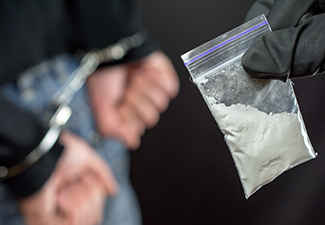Can I Be Arrested for Drugs That Aren’t Mine?
Nov. 14, 2023
 It’s a nightmare scenario: You’re being charged with drug possession or trafficking even though the drugs never belonged to you. You might think this kind of thing only happens on TV or in movies, but the reality is that it can happen to just about anyone. If you find yourself facing charges for something that was out of your control, I can help you explore legal options for building a case so that justice can be served.
It’s a nightmare scenario: You’re being charged with drug possession or trafficking even though the drugs never belonged to you. You might think this kind of thing only happens on TV or in movies, but the reality is that it can happen to just about anyone. If you find yourself facing charges for something that was out of your control, I can help you explore legal options for building a case so that justice can be served.
As a seasoned criminal defense attorney, I've spent over two decades defending clients in situations like this across Lawrence, Olathe, Overland Park, Lenexa, and areas in both Kansas and Missouri. In my practice, I frequently encounter individuals who are worried about the possibility of being arrested for drug possession charges that aren't rightfully theirs. This fear is indeed valid, given the life-altering implications a wrongful accusation of drug possession could have. Call me at Chahine Legal LLC to delve into the legal intricacies surrounding constructive possession and explore how we can work together on your defense against the charges.
What Is Constructive Possession?
Constructive possession is a legal principle that allows an individual to be charged with drug possession even if they don't physically possess the drugs. The prosecution must demonstrate that the accused had control over either the drugs or the area where the drugs were found.
Suppose drugs are discovered in your car or home. In that case, you can be charged with constructive possession if it's proven that you were aware of the drugs and had the capacity to exert control over them.
Consider another scenario: drugs are found in a shared space like a dorm room or an apartment's common area. Here, all residents who have access to that space could potentially face drug possession charges, regardless of who the drugs belong to.
Know or Should Have Known
The state, in its bid to establish constructive possession, must prove that you either knew about the drugs or should have known about their presence. This requirement often proves challenging for the prosecution, as they need to provide evidence that confirms your awareness of the drugs.
For instance, if drugs are in plain sight, say on a table or in an open bag, and you're nearby, this could be used as evidence of knowledge. Likewise, if drugs are found in your personal belongings or an area under your control, it could be inferred that you knew about them. But, if drugs are found in a shared space with no direct link to you, or if they're hidden or concealed, proving knowledge or 'should have known' becomes difficult.
Incriminating Circumstances
Incriminating circumstances often play a crucial role in drug possession cases. These are additional pieces of evidence or factors that suggest your involvement in drug possession. For instance, the presence of drug paraphernalia, such as scales, baggies, or pipes, can indicate intent to use or distribute drugs. Your behavior, like attempting to flee or behaving suspiciously, can also be perceived as incriminating. If you've had past run-ins with the law over drug-related offenses or are found in a location notorious for drug activity, these circumstances can bolster the prosecution's case against you.
Don’t Risk Your Future. Contact Me.
Being implicated in a drug possession case for substances that aren't yours is a grave matter with far-reaching implications. Having a thorough understanding of constructive possession, the significance of 'knowledge or should have known', and the impact of incriminating circumstances can equip you to handle such situations better. If you ever find yourself at the receiving end of drug possession charges, it's imperative to engage a seasoned criminal defense attorney, such as myself, who can safeguard your rights and mount a robust defense on your behalf. Reach out to me at Chahine Legal LLC for personable and trusted legal counsel during this difficult time.
